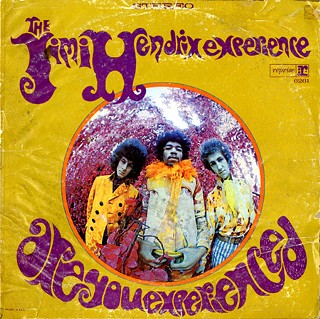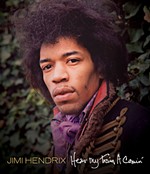Not Necessarily Stoned but Beautiful
Jimi Hendrix reissued
By Margaret Moser, Fri., May 14, 2010
Axis: Bold As Love (1967) ![]()
![]()
![]()
![]()
![]()
Electric Ladyland (1968) ![]()
![]()
![]()
![]()
![]()
First Rays of the New Rising Sun (1997) ![]()
![]()
![]()
Valleys of Neptune (2010) ![]()
![]()
![]()
![]()
I
"You'll never hear surf music again ...."
So intones Jimi Hendrix's disembodied voice at the 4:30 mark of "3rd Stone From the Sun," much as it did 43 years ago. Spoken against all the sonic boom and bass thunder a trio could produce in the blues-rock realm – an aural swirl of transcendent guitar – it meant surf music might indeed never be heard again.
Rock music had little history in 1967. It was still sorting through its heroes of the British Invasion three years earlier. The genre's future was a cipher, yet within six years of Hendrix's 1970 death by overdose, the first round of revisiting the past began when punk and New Wave emerged, patterned on 1960s rock, including surf music. Hendrix was right, though. After him, we never heard it the same way.
Are You Experienced? It was an alluring question to the decade that produced it, the last to enjoy rock & roll in its purest youthful form, one without an elder generation of veteran rockers and parents who'd once been hippies or smoked pot. Hendrix's debut exploded out of the gate in May 1967 in the UK and a few months later in August in the U.S., preceded by well-deserved hype. The Jimi Hendrix Experience burned a hole in the atmosphere between the two release dates on a legend-making performance at the Monterey Pop Festival in June. In December, Axis: Bold as Love was gifted, underscoring the guitarist's otherworldly vision of where the instrument could go.
A year later, October 1968, reverberated the spectacular 2-LP Electric Ladyland, Hendrix's last studio album before his death. The live, non-Experience-backed Band of Gypsies album was released in early 1970, uneven but funky and foreboding. After his death, The Cry of Love presented mostly finished tracks without the Hendrix touch or his final tweaks. After that came 40 years of collections, reissues, box sets, and bootlegs.
II
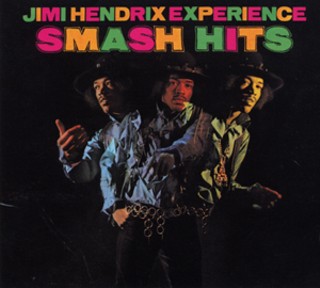
In March, Sony Legacy reissued Hendrix's three studio LPs, while also rebooting First Rays of the New Rising Sun, the 1997 repackaging of The Cry of Love; initial best-of Smash Hits; and a mysterious new compilation titled Valleys of Neptune. Within are expected bonus tracks, vastly improved audio, the usual comprehensive and well-written liner notes, and, in all but Valleys, bonus DVD discs with producer and engineer commentary. No question this is the collection to own for lovers of the man who cemented the Stratocaster as rock & roll's pace car.
Recorded in England in 1967 with Animals bassist Chas Chandler as producer, Are You Experienced levitated into consciousness with the insistent honk of "Purple Haze." This was psychedelic blues-rock not far removed from Roky Erickson's 13th Floor Elevators, who were fine-tuning psychedelia down in Texas, or the Beatles, who were about to alter music with Sgt. Peppers Lonely Hearts Club Band. "This debut album will put the heads of Hendrix's listeners into some novel positions. Be forewarned," cautioned the original liner notes for Are You Experienced.
Yet there was no forewarning for bone-crushers "I Don't Live Today," "Fire," and "Love or Confusion." In the latter, Hendrix's youthful heartbreak is palpable and his lyrics are sweetly innocent as his guitar leads soar out of the world and into the next life: "My heart burns with feelin' ... but my mind, is cold and reeling. Is this love, baby, or is it confusion?" "Third Stone From the Sun" reverberates with astral pulse, while "The Wind Cries Mary" goes the way of the winged. Six unannotated bonus tracks gild the lily on this disc, and the last, "Red House," is sublime.
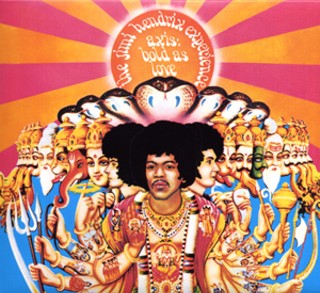
In its original 12 tracks on vinyl, Are You Experienced was and remains an unparalleled exploration of rock guitar's devastating beauty as expressed via fuzz, feedback, distortion, and reverb. Axis: Bold as Love follows closely with its mishmash of utter brilliance ("Little Wing," "Ain't No Telling") and so-so tracks with corny lyrics ("She's So Fine"). It made the Experience the prototype for trios as much as Cream and metal-framed the mold with "If 6 Was 9" and "Spanish Castle Magic." The Axis reissue's DVD features Chandler and Hendrix's engineer Eddie Kramer offering fascinating tidbits of the sessions, and listening to Hendrix's singing voice unaccompanied is a reminder of his "Stone Free" vocals.
There's a poignancy in Electric Ladyland, because the dynamic of making records was changing so fast. Electric Ladyland had a conceptual heart that bespoke Hendrix's desire to create cohesive musical compositions. It's the jumping-off place for speculating what direction he might have gone, because he was truly standing at the top of the mountain, about ready to leave orbit. Hendrix had molted in plain sight, with a dreamy, thoughtful, mystical side and a tough, fiery attack that more than ever called upon his early woodshedding with Curtis Knight and the Isley Brothers.
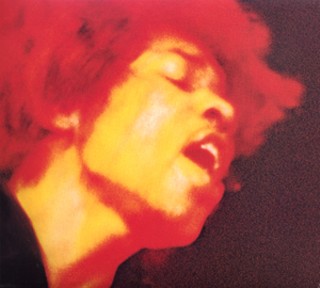
The panoply of music within Electric Ladyland reaffirms Hendrix's potential and promise, the superior audio and groundbreaking direction. "Voodoo Chile" may be the first great blues song from a rock musician, steeped in Hendrix's mojo guitar and Steve Winwood's swamp-drenched organ. Hendrix's compositions sound effortlessly pro and confident and pristine: "Crosstown Traffic," "Gypsy Eyes," "House Burning Down," and the especially gorgeous "Rainy Day, Dream Away" with Buddy Miles on drums, plus the apocalyptic "1983 ... (A Merman I Should Turn to Be). The covers evoke colorful influences: Earl King's "Come On (Let the Good Times Roll)" and Bob Dylan's "All Along the Watchtower."
Of particular interest in the CD booklet are reproductions of Hendrix's handwritten notes for the album. They contain numerous misspellings yet bear a stylish flair much like Stevie Ray Vaughan's practiced script. Hendrix is methodical about minutia, written on hotel stationery, and even more polite in his requests. Like the DVDs, this reissue minutia is your ticket to ride with the Experience.
III
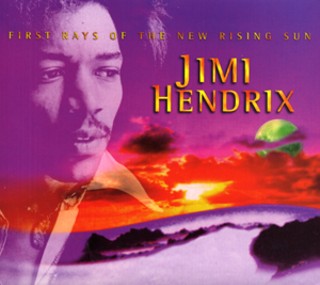
First Rays of the New Rising Sun is 1971's Cry of Love – the first posthumous release of near-complete Hendrix material – reordered with bonus tracks. Cry of Love wasn't an especially satisfying release, but as First Rays, it holds its own weight with such known favorites as "Izabella," "Angel," and "Ezy Ryder," 17 boulder tracks ruminating in his constant themes of mind expansion, the planets, women, and love.
As solid as First Rays is, the unreleased studio recordings of Valleys of Neptune sound like the Hendrix album missing all these decades. Recorded after Electric Ladyland in 1969 and 1970, its ghosts want us to know the creator is at peace, and here's a tantalizing reminder of what we've been missing. A chunky version of Cream's "Sunshine of Your Love" and moody closer "Crying Blue Rain" indicate his love for the instrumental form, yet as with Electric Ladyland, he's moving at the speed of light through the lyrical and musical cosmos.
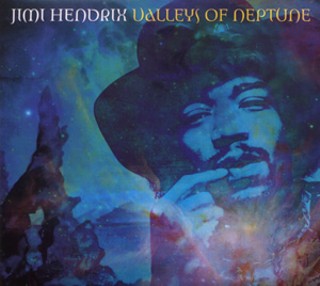
The second cut bows the title track, "Valleys of Neptune." At the time of its composition, the country was in the midst of grand space exploration, a Hendrix obsession from childhood. "Valleys of Neptune" is awash in phosphene light, six-string will, and a cast-iron rhythm, glorious in effort though it lacks the volatile Hendrix lead, and the album generally leans toward the Band of Gypsies direction with revamped versions of "Red House" and "Stone Free." The cover is a tinted Linda McCartney photo superimposed over a watercolor Hendrix painted at age 10, printed in wistful blues and vulnerable greens.
It's a frivolous luxury to play the guessing game – what a Hendrix jazz or blues record would have sounded like. Miles Davis and Gil Evans waited in the wings, and then there's all the living bluesmen he could have recorded with. Imagine Hendrix at those London Howlin' Wolf sessions, or him asking Muddy Waters to tour with him and matching strings with Freddie King in Texas or joining Earl King onstage in New Orleans at Jazz Fest.
And here's a thought: Hendrix hadn't discovered Texas guitarists yet. It's heartbreaking enough to realize Stevie Ray Vaughan has been gone 20 years this August because of bad fortune; Hendrix will be gone 40 years in September by his own hand, a fucking overdose of some fucking sedative. Passed out, aspirating vomitus, choking to death. A fucking waste.
Hendrix mattered. Mattered in a way most musicians never will, mattered in a way that makes the kids still line up with their Fenders and Gibsons and Ibanezes and whatever pieces of wood and strings they can wrap their grubby little hands around because damn it feels good to make music. Last month, backstage at Antone's, 16-year-old blues native Carson Brock huddled with bassist Jake Draper and drummer Wes Armstrong and swore: "Every day, I look at Hendrix lyrics and put a quote on my Facebook. Today, it was, 'Not necessarily stoned but beautiful.'" The other two nodded at the guitarist in great understanding. The trio's set that evening included "Manic Depression" and "Voodoo Chile."
Hendrix's August 1969 performance at Woodstock, performing "The Star-Spangled Banner," gave youth culture its own identity, the ultimate freak flag in the Stars and Stripes. He's a million miles away and right here in your shredded speakers.
That's the power of Jimi Hendrix then as now. He was the Sun King of rock guitar. He explored the sonic universe for four superstar years and mapped it so thoroughly that players are still trying to punch holes through it. Every generation since has understood that guitar begins with Hendrix 101.
IV
"Lie down on the carpet and put your head between the speakers."
It was a ritual in the days of vinyl. That Sunday, January 1968, my boyfriend Matt Palmer brought over his stereo – the whole thing – so we could listen to records while lying head-to-head on the living room carpet. He put his copy of Are You Experienced on the turntable, and we settled in as "Purple Haze" descended.
Listening like that was an experience. Hendrix murmured questions in the title track, asking over and over, "Have you ever been experienced?" Then adding as if to reassure me: "Well, I have. ... Not necessarily stoned but beautiful." Ah yes. That made sense to my limited world, where Barbies and playing with my brothers in the backyard on the swing set were not-too-distant memories.
"Jimi is my man," I scribbled in purple Flair pen on the back of my copy of Are You Experienced that night. Only I didn't have a man; I was 14. I barely had boys. But I did have this voice coming out of the speaker, beckoning me to another plane of consciousness, urging me to think beyond borders. I played that record so much it developed a skip near the beginning of "Are You Experienced," so that when I put it on, Hendrix chirped, "If you can just get your mind together ... mind together ... mind together ... mind together ...."
It was difficult to tell if Hendrix's death cast a pall over Seattle the day it happened, because mid-September 1970 was gray and overcast like the others. I'd lived in Rain City about four months, relocated with my mother after The Divorce, and pining for San Antonio sunshine so hard that I ran away from home. Again. This time I landed at the Sky River Rock Festival in rural Washington State below Seattle. A ragtag group of festival leftovers, social misfits, nomads, and runaways had gathered in a makeshift commune.
The commune was not going well. Grumbling began over the squash stew that was dinner that night and every night. The shampoo ran out, then soap. Crabs infested the entire group. Funds depleted quickly, and women started to leave after one man proposed they should wear washcloths instead of tampons or pads because it was "more natural and saved money." One of the communals made a trip into nearby Washougal for supplies that day and returned with the news of Hendrix's death. The word filtered through the discontented Saturday night campfire, and a few were moved into action.
An AWOL marine named Maynard jumped up and began beating his skinny bare chest. He always wore a leather belt around his head, and his shorn hair was an anomaly among the longhairs. He arched his back and howled and danced Apache wild around the sparking campfire. Someone with a guitar began playing "All Along the Watchtower," and a few joined in, while yet another knew the words enough to sing them, huddled in the chilly night under the pines.
"There must be some way out of here, said the joker to the thief."
I was so homesick for a life that didn't exist anymore. Sixteen years old, I was already two eons from the living room floor with my head between the speakers, tripping out on love or confusion and Spanish castles and getting my mind together. Divorce took my childhood with the mother, father, and brothers under one roof, and now, here was Hendrix, chain-sawed out of my rotten little teenage life. The artery gushed, never staunched, and when Janis Joplin took her heroin swan dive three weeks later, the bell tolled for the first dynasty of rock royalty.
I'd left the commune.
V
The vinyl disc fell from its ratty sleeve, once recklessly shored up with masking tape. This copy of Are You Experienced has been in my possession for 43 of my 56 years, having once survived a flood, and looking it (see LP, right). "Jimi is my man" is faded a deep indigo, as is the nearly indecipherable "Margo," my nickname of choice then.
It slid on the circular turntable, spinning the not so faded yellow-and-pink label into the swirling vortex I stared at endlessly. The needle sank into the vinyl, the last song on the second side, Hendrix's voice inviting me to groove once again.
"If you can just get your mind together ... mind together ... mind together ... mind together ...."






